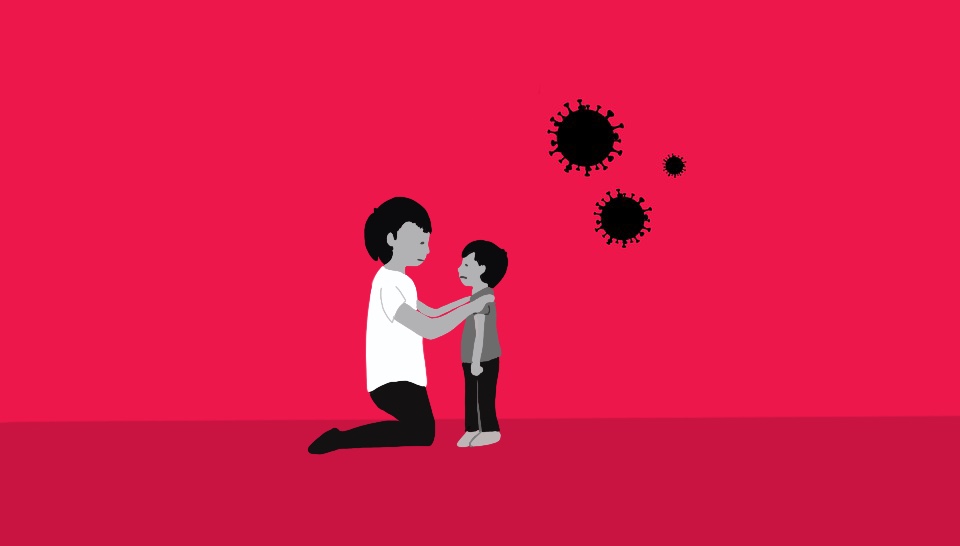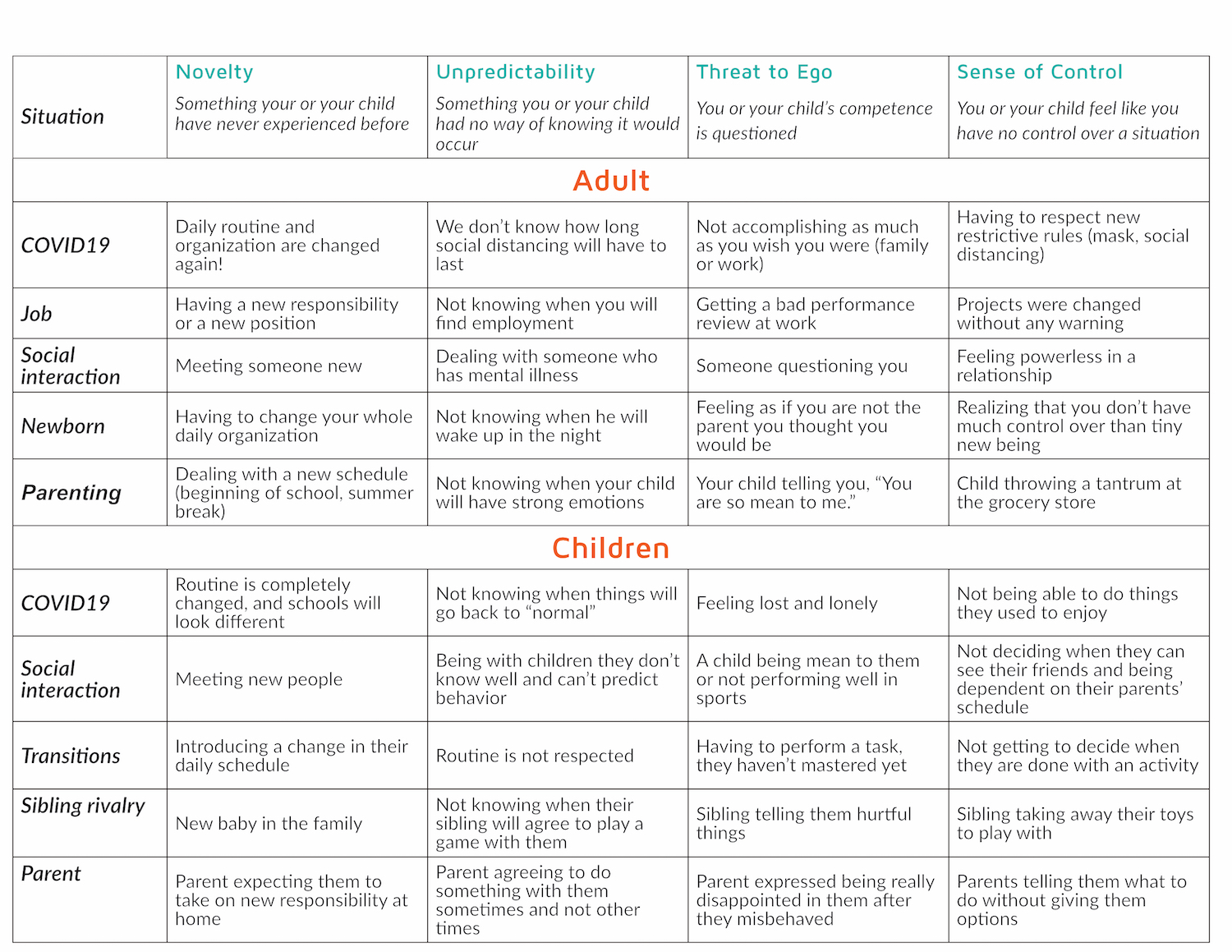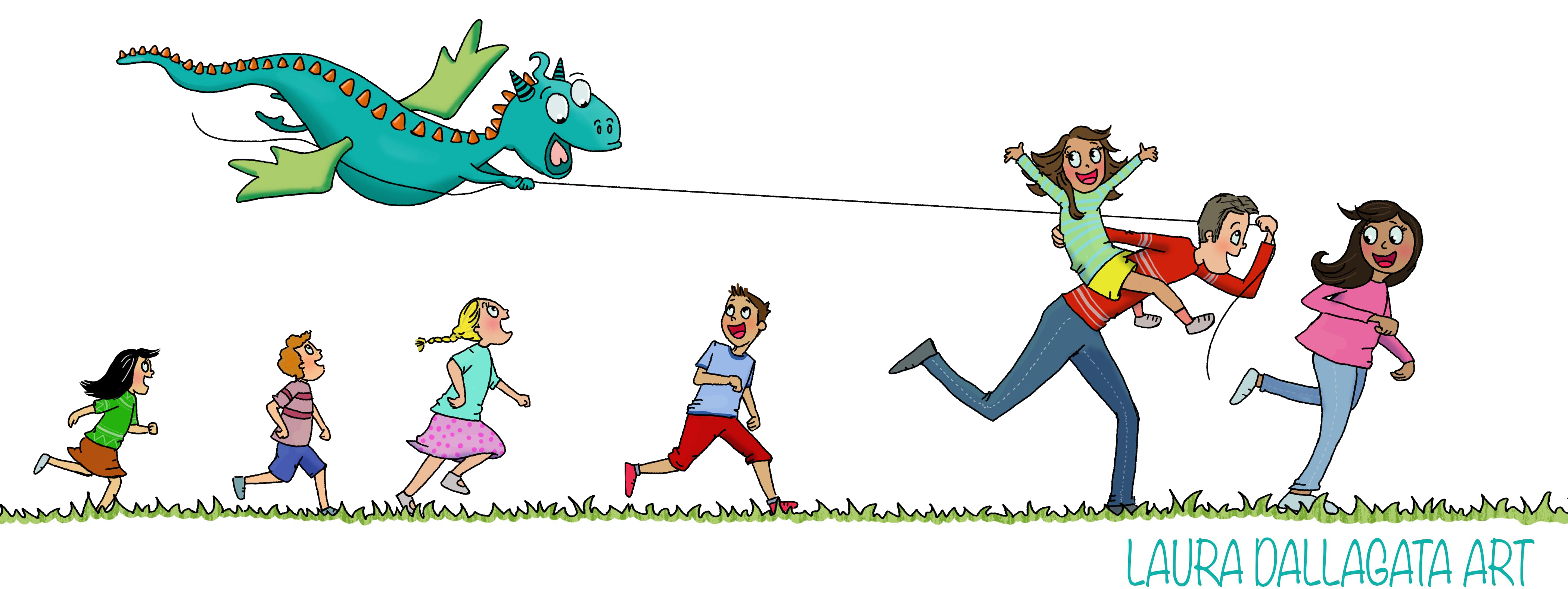
- Understanding the function of stress helps reframe the way we think about it.
- Stress can have different manifestations, some more surprising than others!
- Novelty, unpredictability, threat to ego, and low sense of control. Identifying which of these affects you the most can help deal with your stress better.
- Mindfulness, gratitude and laughing are some of the strategies to stay ahead of your stress and keep it under control.
In our society, “stress” has become a bad word. It feels omnipresent, and like “the enemy”. However, stress is doing an amazing job at what it is meant to do — help us survive by activating our “fight or flight” response. If we are facing a grizzly bear, we want to be stressed – we want to fight (or flight!), because that’s our only chance of surviving, but what about the stress that comes with facing a pandemic?
COVID19 Checks All Potential Stress Factors
!àTwo main types of stressors exist: absolute (e.g., you are facing a grizzly bear, someone is mugging you), and relative ones (e.g., you lost your keys, or someone criticized you). Our lives in the modern world have quickly evolved to a place where we do not face absolute stressors nearly as much as relative stressors, which we experience several times a day. However, our brain has not changed at the same speed as the world around us, and it does not differentiate between these two stress factors, which leads to the same chain reaction for both. The four factors that elicit a stress response is NUTS. Not literal nuts (except maybe if you are allergic to them!) but it stands for Novelty, Unpredictability, Threat to ego, and low Sense of control. Seeing that the COVID19 situation potentially checks all those, it is easy to understand why we might feel under a lot of pressure at the moment.
Stress response in the brain lets us fight or flight.
When we are stressed, a cascade of events happens, starting in the hypothalamus (a structure in the brain), down to the adrenal glands (located on top of the kidneys) along what is called the hypothalamic-pituitary adrenal axis (HPA). HPA is responsible for releasing cortisol, often known as the stress hormone. This response enables us to fight or flight by getting our body ready to face danger head on (e.g., eyes dilate, hairs stand on, heart rate and breathing speed). This is great if we are facing a grizzly bear. However, it makes it hard to function well if you have to figure out how to safely grocery shop while respecting social distancing.
Chronic Stress Has Many Different Manifestations
The COVID19 situation has been putting us under a lot of stress, from sheltering in place, isolation, the constant stream of bad news and now by being released from quarantine. We have to learn to live in surroundings that are different than what we were used to. That chronic stress comes with a ripple effect causing many different behaviors in ourselves and our children:
- Digestive issues
- Sleep issues
- Restlessness: our body is accumulating energy (so if your kid is acting like a feral animal, running around the house and jumping everywhere, they are doing what they need to do to relieve stress: getting it all out!)
- Looking for immediate pleasures with a tendency to over-consume (food, social media, TV, online gaming; and for adults specifically: alcohol, coffee, smoking or even online shopping)
- More aggressive behaviors over trivial things that wouldn’t usually trigger us.
- Fatigue: being on the ready in case we need to fight at all times is exhausting!
- Difficulty focusing
- In adults, you might also notice reduced sex drive (cortisol affect the testosterone production).
Dealing with your stress starts by acknowledging it is an amazing ally
Rather than fighting and trying to mute our stress, the best approach is understanding it and making it our ally. Two types of complementary approaches can help us do so:
- By rethinking the way we consider stress.
- Being aware of the manifestations of stress (listed above), so we can become aware of our state of mind, and give ourselves some grace.
- Considering our stress as an ally rather than an enemy. It is actually proven that stress has adverse effects on your body, only if you think it does!*ref
- Understanding which factor makes you go N.U.T.S. the most! To do so, check the table below. Notice for each situation, which of those factors of stress you and your close ones identify most with. It is a great way for you to see when you might be overreacting to a situation by knowing what stressors you react the most to. And by understanding what stresses out your children, you will be able to modify their environment to make it easier on them.
Table. The Four Stress Factors and How They Might Translate in Different Situations

- Take steps to lower your level of stress when it is already present, by adopting:
- Healthy sleep habits
- Healthy nutrition
- Yoga and meditation
- Practicing deep breath
- Practicing mindfulness
- Practicing gratitude
- Laughing
- Exercising
- Talking with people you trust
- Doing acts of kindness
- Setting up a routine
- Changing our expectations and adapting to our new life
- Being mindful of our media exposure (it has been proven that sensationalizing and long exposure to media after 9/11 was directly linked to higher levels of stress).
- Being mindful of stress resonance: when we see someone being stressed, our brain will release cortisol. And the emotionally closer we are to that person, the more cortisol will be released. This is why if we are stressed presently, our children might be giving us an especially hard time, because our stress directly makes them feel stressed. This is why we need to manage it, which will lower our children’s stress, which in turn will lower ours, which… you get the idea!
We will be able to hug loved ones again without feeling stressed.
Shelter in place has relaxed in most places. However, contrary to what we naively thought three months ago, life is not back to the way it was before. In January, we did not get a stress response by someone grabbing a can of tomatoes while almost touching us at the grocery store. And those newly learned stress responses, even when they won’t be necessary anymore to protect us, will take a while to undo. The good news is, our brain will learn again to hug without getting stressed when it will finally be safe, by realizing through several exposures that nothing happened and that everything is okay. But in the meantime, our stress is our best ally. It will protect us and motivate us to observe healthy behaviors when we are outside the safety of our houses.
We are living in a different environment which introduces a lot of novelty, unpredictability and where we have less control over our daily decisions. All of this can impact our ego: being stressed can make us feel less resilient than what we thought we were. However, the way we are feeling right now is entirely normal. So be gentle to yourself, watch that dumb show that makes you laugh, call that friend you wish you could see in person, take 5 minutes to breathe deeply, and go at your own pace. Afterall we are all in this together, now more than ever is the time to be present for people that matter in our lives They need it, and it’s good for us!
REFERENCES:
- K. McGonigal (2016). The Upside of Stress: Why Stress Is Good for You, and How to Get Good at It
- https://www.happinesslab.fm
- https://sonialupien.com
Mathilde is a Doctor of neurosciences who specialized on the impact of playing educational games on children’s cognition during her research. She also has a strong interest in positive discipline and is a certified educator. She lives in California with her husband and her three children who provide her constant opportunities for learning in the parenting department!
